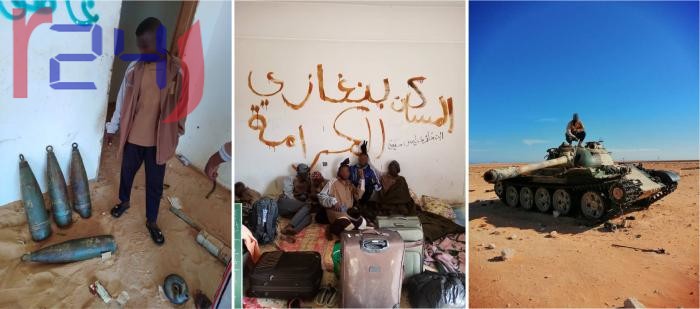An investigation by Human Rights Watch revealed that a private Emirati security company had deceived hundreds of Sudanese workers, by sending them to guard in Libya, in support of the forces of the retired Libyan General Khalifa Haftar, after they had lured them to work inside the Emirates.
In its investigation, the human rights organization told the stories of Sudanese workers who were victims of deception by the “Black Shield Security Services” company, which has unclassified links to the UAE Ministry of Defense.
Amer had no idea where he was – just that he was many miles away from where he had planned to be.
It wasn’t until he and his fellow Sudanese workers noticed the labels on the water bottles, he said, that they realized they had unwittingly been brought to conflict-ridden Libya.
Amer’s journey from his hometown of Khartoum to Libya had begun four months earlier, when the 29-year-old traveled to the United Arab Emirates (UAE), expecting to work as a security guard in the air-conditioned skyscrapers or cavernous malls of the capital, Abu Dhabi. But from the day he arrived in September 2019, Amer had grown increasingly uneasy about Black Shield Security Services, the Emirati security services company that hired him.
His passport and phone were taken away. He was required to undergo a months-long military training. And he was kept in the dark about where he and hundreds of other Sudanese recruits would eventually be posted.
Despite his nagging doubts, Amer never imagined the company would drop him and about 270 other Sudanese workers onto a military base in Libya, a country in conflict where governance remains divided between two opposing entities: the internationally recognized and Tripoli-based Government of National Accord (GNA) and the rival Interim Government based in eastern Libya that is affiliated with the UAE-backed armed group known as the Libyan Arab Armed Forces .
Amer and the other men were transported to, and housed in, a dilapidated military compound in the eastern Libyan town of Ras Lanuf. The town is located in the so-called oil crescent, a strip along the eastern coast of the Gulf of Sirte where four of Libya’s six oil terminals are located and through which more than 50 percent of its crude oil exports leave the country.
In the compound, the Sudanese men lived alongside Libyan fighters aligned with the LAAF under the command of General Khalifa Hiftar. They were told they would guard the surrounding oil facilities the LAAF controlled.
Since 2016, the oil crescent has seen multiple offensives by rival forces seeking to control the region and its oil supply, each causing deaths and extensive material damage.
As of September 2020, General Hiftar’s forces retain control of the region and the oil terminals that they seized in January 2020.
Amer and the other Sudanese men, whose names we have changed to protect their identities, experienced several exploitative recruitment practices and migrant labor abuses commonly faced by migrant workers in the UAE and the wider Gulf region.
What appears to be unusual in their case is that the deception they were subjected to ultimately put them at risk of becoming potential military targets in a country embroiled in a years-long civil war, in what could amount to a violation of international humanitarian law.
Our investigation into their plight highlights just one example of the UAE’s pernicious involvement in foreign conflicts, which includes funneling vast amounts of money and weapons to abusive local armed groups in Yemen and Libya and hiring foreign fighters to help wage its proxy wars in the region.
In the last five years alone, UAE-led proxy forces have arbitrarily detained, forcibly disappeared, and tortured Yemenis in south and east Yemen, including Yemeni activists who have criticized coalition abuses. In October 2019, an investigation by Buzzfeed claimed that the UAE had hired former US soldiers to kill prominent clerics and Islamist political figures in Yemen in a targeted assassination campaign. In what appears eerily similar to the results of our investigation, unverified reports surfaced in 2018 of Chadians being recruited into jobs with Emirati security firms in the UAE and then sent to fight in Yemen.
For Amer, it all began, unremarkably enough, in the fall of 2019 in Khartoum. He told Human Rights Watch that he heard about well-paying security guard positions that were opening up in the UAE and being recruited for in Sudan. He applied through one of two local recruitment agencies, submitted his passport, and paid 12,000 Sudanese pounds (US$266 at the time) in recruitment fees.
He expected to be posted in malls, hospitals, hotels, or at the entrance of embassies or government buildings. Within days, the recruitment agency had his work visa ready and a plane ticket to Abu Dhabi for September 22, 2019. He was not presented with a job offer letter nor an employment contract while still in Sudan, which, unbeknown to him, violates a 2015 UAE regulation that prohibits a foreign worker from entering the country without having first signed an employment offer that conforms to a Standard Labor Ministry employment contract.

